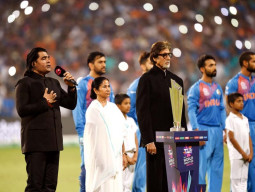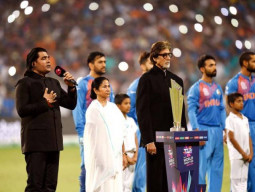
Following the popular backlash against the fiasco of Pakistan’s national anthem rendered by Shafqat Amanat Ali Khan at the T20 world cup in Kolkata, the maestro countered in a tweet: “I am deeply hurt by the little faith that my fellow Pakistanis have in me.” Further on, he also defended himself by saying that he did not forget “our beloved qaumi tarana” but admitted that there were some “technical glitches”, for which he rendered a grudging apology.
As the famous Persian verse states: “Aan Cheh keh Aayaan Ast/Cheh Hajat beh Biyaan Ast”, meaning “that which is self evident, doesn’t need an explanation”.
Unfortunately, given our national psyche of self-denial and lack of self reflexivity, it seems that there is a need to unpack the self-evident in the face of self-serving narratives of denial, which, in this case, is summed up by the best vocalist in Pakistan, Ustaad Shafqat Amanat Ali Khan, who was invited to T20 World Cup between India and Pakistan in Kolkata, for reciting the national anthem of Pakistan.
It is appalling to note that it was not only the apparent slips in his singing the anthem that everybody watching on live television noticed, but a sheer absence of feelings and passion, as if the singer was singing a song in a foreign language that didn’t touch him at all. All this became even more apparent when compared to Amitabh Bachan’s rendition of Indian national anthem. Bachan moved the audience with his impassioned voice beyond expectations and created an energy that came through the TV screens.
The question, however, is not whether Shafqat Amanat Ali forgot or mispronounced the verses of the national anthem, but of the absence of energy and emotion that defines vocalisation of any national anthem. A singer who carries the tradition of the Patiala family, such as Shafqat Amanat Ali, is Ustaad enough to know that the kind of music he’s been creating so far, is not without a tremendous emotional and spiritual impact on many of his listeners. However, this time, it goes without saying that Shafqat Amanat Ali, whose voice I have loved like many other music lovers, has disappointed Pakistanis by a lacklustre performance of Pakistan’s beautiful national anthem.
Despite all the chaos and instability that seems to define Pakistan today, there are a few core things that continue to define the essence of being a Pakistani. One of these is the national anthem, which has an elevating effect whenever and wherever it is played. Whether it is the Hazuri Bagh’s ceremony of Parcham Kushai in Lahore on August 14 (where I led the national anthem group during my school days), or any international event where Pakistan is represented by its national anthem, each and every word in this tarana inspires the love for a country that is tarjuman-e-maazi (representative of the past) and shaan-e-haal (the glory of the present) — the words of elevating importance that the maestro lost in his feeling-less mumblings. He also subverted a key verse of the anthem describing the national flag: by terming it paracham-o-sitara-o-Hilal — the flag, the star and the crescent — as against the correct verse, which translates as flag of star and crescent.
Moreover, for anyone singing this anthem, there is a certain kind of huzoor (presence) in its words, which has an inspiring effect, especially on the people who understand its language. Indeed, perhaps, it is nothing short of a miracle that such understanding spans a huge segment of the world’s population, spanning the peoples of the Indo-Pakistani subcontinent besides Iran, Central Asia and all those having an inkling of Indo-Persian Islamic culture.
Pakistanis might have grown fed up with the endless trashing of their country’s image in the international media, and by the local terrorist and apathetic politicians, which may as well have dampened their spirits on and off as citizens of Pakistan. However, the qaumi tarana is something that rekindles hope and determination in our people and it goes far beyond a T20 match with India, which is, after all, a game, where one party lost and the other won. However, the soulless rendition of the national anthem by the maestro of classical music in Pakistan, is something that needs to be seen for what it was — a lack of soulful presence (huzoor), which is, at the same time, the opposite of the eternal spirit that permeates and enlivens Pakistan’s national anthem.
Published in The Express Tribune, March 25th, 2016.
Like Opinion & Editorial on Facebook, follow @ETOpEd on Twitter to receive all updates on all our daily pieces.





















1713272658-0/Copenhagen-fire-(1)1713272658-0-270x192.webp)






















COMMENTS (5)
Comments are moderated and generally will be posted if they are on-topic and not abusive.
For more information, please see our Comments FAQ